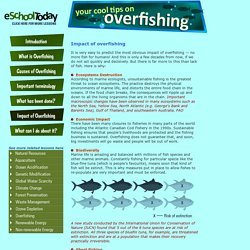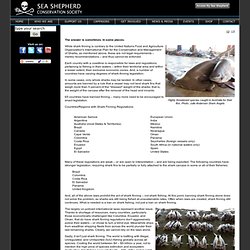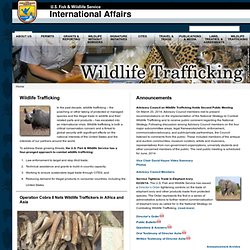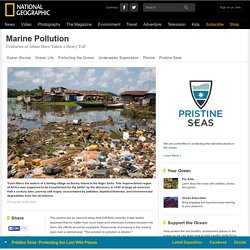

What are the impacts of overfishing. Impact of overfishing It is very easy to predict the most obvious impact of overfishing — no more fish for humans!

And this is only a few decades from now, if we do not act quickly and decisively. But there is far more to this than lack of fish. Here is why: Ecosystems Destruction According to marine ecologists, unsustainable fishing is the greatest threat to ocean ecosystems. Economic Impact There have been many closures to fisheries in many parts of the world including the Atlantic Canadian Cod Fishery in the 1990s. Biodiversity Marine life is amazing and balanced with millions of fish species and other marine animals. A new study conducted by the International Union for Conservation of Nature (IUCN) found that 5 out of the 8 tuna species are at risk of extinction. Ghost Fishing Many large fisheries stay for weeks and months in deep seas and sometime loose their nets. Is shark finning illegal? The answer is sometimes.

In some places. Highly threatened species caught in Australia for their fins. Photo: Julie Andersen Shark AngelsWhile shark finning is contrary to the United Nations Food and Agriculture Organization's International Plan for the Conservation and Management of Sharks, as mentioned above, these are not legal requirements – merely recommendations – and thus cannot be enforced. Each country with a coastline is responsible for laws and regulations pertaining to fishing in their waters – within their territorial area and within a lesser extent, their exclusive economic zones. And, a number of countries have varying degrees of shark-finning legislation.
In some cases, only whole sharks may be landed. 65 countries have banned finning – many more need to be encouraged to enact legislation. Countries/Regions with Shark Finning Regulations: Fish & Wildlife Service - International Affairs. Announcements Advisory Council on Wildlife Trafficking Holds Second Public Meeting On March 20, 2014, Advisory Council members met to present recommendations on the implementation of the National Strategy to Combat Wildlife Trafficking and to receive public comment regarding the National Strategy.

Following discussion among Advisory Council members on the four major subcommittee areas, legal frameworks/reform, enforcement, communication/advocacy, and public/private partnerships, the Council listened to comments from the public. These included members of the antique and auction communities, museum curators, artists and musicians, representatives from non-government organizations, university students and other concerned members of the public.
The next public meeting is scheduled for June, 2014. Vice Chair David Hayes Video Summary Photos Advisory Council Members Service Tightens Trade in Elephant Ivory 02/26/14- The U.S. Announcement Archive In the News News Archive Credit: USFWS Quick Links. What is the Great Pacific Ocean Garbage Patch? Not all garbage ends up at the dump.

A river, sewer or beach can't catch everything the rain washes away, either. In fact, Earth's largest landfill isn't on land at all. The Great Pacific Garbage Patch stretches for hundreds of miles across the North Pacific Ocean, forming a nebulous, floating junk yard on the high seas. It's the poster child for a worldwide problem: plastic that begins in human hands yet ends up in the ocean, often inside animals' stomachs or around their necks. This marine debris has sloshed into the public spotlight recently, thanks to growing mediacoverage as well as scientists and explorers who are increasingly visiting the North Pacific to see plastic pollution in action. What's it made of?
The Great Pacific Garbage Patch has sometimes been described as a "trash island," but that's a misconception, says Holly Bamford, director of NOAA's Marine Debris Program. Whales can be used in perfume, soap, and candles - Boston Parenting & Education. Science teachers in Fall River, MA often require students to complete projects on whales.

This assignment is quite beneficial because there are a ton of interesting facts about these animals. If students carefully read the information from their research, they can learn that people have used whales to get oil, soap, perfume, candles, food, and lots of other products. Whales can be exploited for food: Whale meat is part of the Japanese diet. This food is also part of their school lunch menu. Marine Pollution. The oceans are so vast and deep that until fairly recently, it was widely assumed that no matter how much trash and chemicals humans dumped into them, the effects would be negligible.

Proponents of dumping in the oceans even had a catchphrase: "The solution to pollution is dilution. " Today, we need look no further than the New Jersey-size dead zone that forms each summer in the Mississippi River Delta, or the thousand-mile-wide swath of decomposing plastic in the northern Pacific Ocean to see that this "dilution" policy has helped place a once flourishing ocean ecosystem on the brink of collapse. Pollution's Many Forms There is evidence that the oceans have suffered at the hands of mankind for millennia, as far back as Roman times. But recent studies show that degradation, particularly of shoreline areas, has accelerated dramatically in the past three centuries as industrial discharge and runoff from farms and coastal cities has increased.
Noise Pollution Pollution is not always physical.